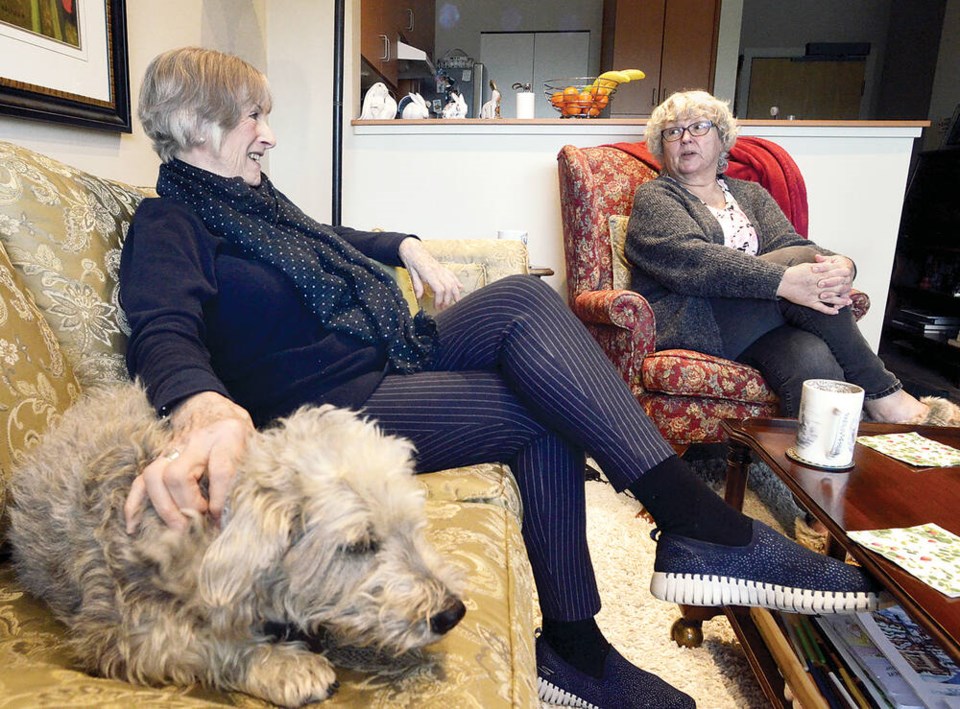The references to The Golden Girls can’t be avoided, but sometimes life imitates art.
Hollyburn Community Services Society and SFU Renewable Cities are looking to foster new ways to get seniors living together as roommates in under-used single-family homes – a major untapped resource in the housing crisis.
Single-detached homes comprise almost half of all the housing in B.C., yet 60 per cent are occupied by just one or two people, according to Statistics Canada data compiled by Alex Boston, Renewable Cities executive director. It means, even in a housing crisis, there are a lot of empty bedrooms.
A golden opportunity
Single adults sharing a home with roommates is far more common in Europe, said Joy Hayden, executive of innovation and engagement for Hollyburn, but, for some reason, it’s just not done as much in North America. The benefits we are missing out on are manifold, she added.
The most obvious mutual perk is financial, creating potentially below-market rentals for seniors in need while also providing revenue for owners on a fixed income. It becomes especially urgent anytime a senior who has been renting in one place for a long time suddenly finds themselves in need of a new home at today’s market rates.
SFU was eager to partner on the project because of its potential to combat climate change by creating new homes for seniors without having to build them from scratch. If 10 per cent of the solo- or couple-homeowners in B.C. welcomed a tenant, it would save about 150,000 tonnes of greenhouse gas emissions annually, Boston estimates.
Perhaps most important though: having someone nearby also brings significant health benefits.
“I think that social isolation is a significant issue that doesn’t get enough attention,” Hayden said. “I think you’re improving quality of life by having people living together.”
Housing solutions lab
But some seniors may not want the responsibility of being landlords. Others may not know how to go about finding a good roomie. Perhaps they like the idea, but their home would need renovations first.
With $250,000 from CMHC’s housing solutions lab, Hollyburn and SFU will be researching ways to iron out the wrinkles (pun absolutely not intended) and scale the program up to the provincial or national level.
New affordable housing units are coming but they take years to get through the funding, rezoning and construction process, meaning there’s an immediate need to seek out “hidden housing solutions,” Hayden said.
“We have a real housing crisis and if we could find faster alternative ways to open up existing housing … we could start to put a dent in this crisis,” Hayden said.
If just 10 per cent of the detached homes lived in by only one or two people on the North Shore offered an unused bedroom to a senior, it would create 1,500 new homes.
“Even if one per cent is interested, you know, we’re starting something,” Hayden said.
Golden Girls
West Vancouver residents Bunny Brown and Sheila Baxter have lived as roommates and can vouch for the benefits.
The two knew each other through the West Vancouver Police Department’s Victims Services Unit, where Brown was the co-ordinator and Baxter was a volunteer. Brown had leased the upper two floors of a single-family home and was only just turning her mind to finding a roommate when Baxter suggested herself for the role, even though her kids weren’t so sure about the plan.
“You take a chance. Like I said to my kids, the worst thing is I just find another apartment. Let’s give it a shot,” Baxter said.
The two got along, (and so did their dogs). They respected each other’s values and had complementary skill sets. Baxter didn’t mind tending the garden or shovelling the walk. Brown hired a cleaner to come in from time to time.
“I think it’s an excellent idea for someone who wants to age in place but might need assistance with some things,” Brown said. “There should be some agreement ahead of time as to who’s responsible for what and what each of you is willing to give to the situation.”
Financially, it made a lot of sense for both. They were able to live in a much nicer space than they would have otherwise at a fraction of the cost.
They also had wild dinner parties, dog-sat for one another, and welcomed each other’s families visiting from out of province. Brown said she felt a sense of comfort knowing there was someone else present.
It’s not for everyone, both Brown and Baxter concede, especially if you aren’t willing to be flexible in your habits. But there are ways to make it work. They kept their own spaces clean and did their own cooking. They maintained their separate social lives and “weren’t in each other’s hip pockets,” Brown said.
Much like the Golden Girls of the 1980s and '90s, a sense of humour is probably a must, Baxter advises.
Brown and Baxter lived as roommates for 10 more years before the house they were renting sold and they sought out other arrangements. (Baxter still lives with roommates who happen to be old family friends).
“They were good years and it worked out really well for us,” Brown said.
“That lasted longer than most of your marriages,” Baxter quipped in response.
Cue the laugh track.




